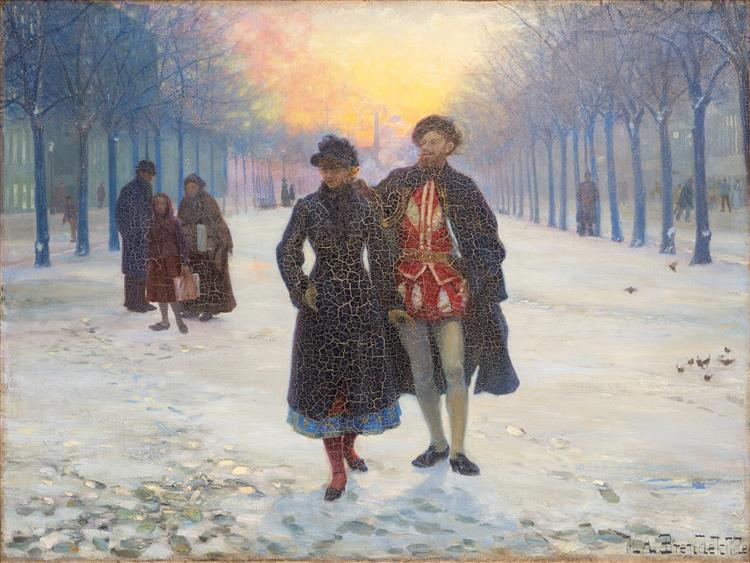Description
The work "Morgen Efter Karneval" (Tomorrow after the Carnival) by Hans Andersen Brendekilde, painted in 1884, enrolls in an artistic tradition that captures the relationship between humanity and everyday life, using color and composition to tell a visual story that evokes serenity after the holiday. Brendekilde, one of the most prominent Danish artists of his time, emphasizes in this piece the contemplation of the moment that follows the spree and the debauchery characteristic of the carnival, presenting a palpable contrast between the vivacity of the celebration and the subsequent calm that surrounds to The scene.
In the painting, the central figure is a young woman who sits in a rural environment, her semi -turned face to the viewer with an expression that alludes to nostalgia and introspection. Behind her, a landscape of green fields extends to the horizon, splashed with flowers that open to daylight. The choice of women as the protagonist is symbolic: it represents the restoration and reflection that usually accompanies the moments of revelry, while the fertile earth suggests a return to everyday life. Loose hair and white clothing contrast with the lush and colorful environment, emphasizing its connection with nature and its emotional state after the effervescence of the carnival.
The color palette used by Brendekilde is rich and vibrant, marked by tones of green, yellow and blue that invite tranquility. The use of color not only establishes a bright and cozy atmosphere, but also provides a strong feeling of naturalness and freshness. The nuances of the sky and the shadows that fall on the field instils a sense of depth and volume, key attributes that characterize the realistic style of the artist. Through the light, the author manages to insinuate the emotions of his model, creating a link between the exterior and the internal state of the figure.
Brendekilde works here within the framework of naturalism, a style that opposes representations idealized by romanticism. When trying to capture moments of everyday life and reflect the human being in his environment, the artist aligns with a current that seeks to represent reality without artifice. This work, like many of its contemporaries, explores the fleeting moments of emotional connection, often marked by a contrast between the celebration and the subsequent loneliness or reflection.
The year of 1884 is significant for Brendekilde, since it is consolidated as one of the most innovative painters in his country, combining reality with the poetic. "Morgen Efter Karneval" is a testimony of his ability to capture the subtleties of life, showing us that behind each celebration there are moments of recollection that are equally valuable. This work, like others of its production, is linked to the precision of the great masters of the nineteenth century, although Brendekilde maintains a distinctive style that puts the essence of the simple and the ephemeral.
Thus, in "Morgen Efter Karneval", Brendekilde not only paints a scene; It invites us to think about what it means to be present at the time after an intense experience, providing the viewer with that moment of reflection that allows us to appreciate beauty in everyday life. This work reminds us that life is a fabric of moments, where each thread, whether of joy or introspection, contributes to the complexity of our life experience.
KUADROS ©, a famous paint on your wall.
Hand-made oil painting reproductions, with the quality of professional artists and the distinctive seal of KUADROS ©.
Art reproduction service with satisfaction guarantee. If you are not completely satisfied with the replica of your painting, we refund your money 100%.

